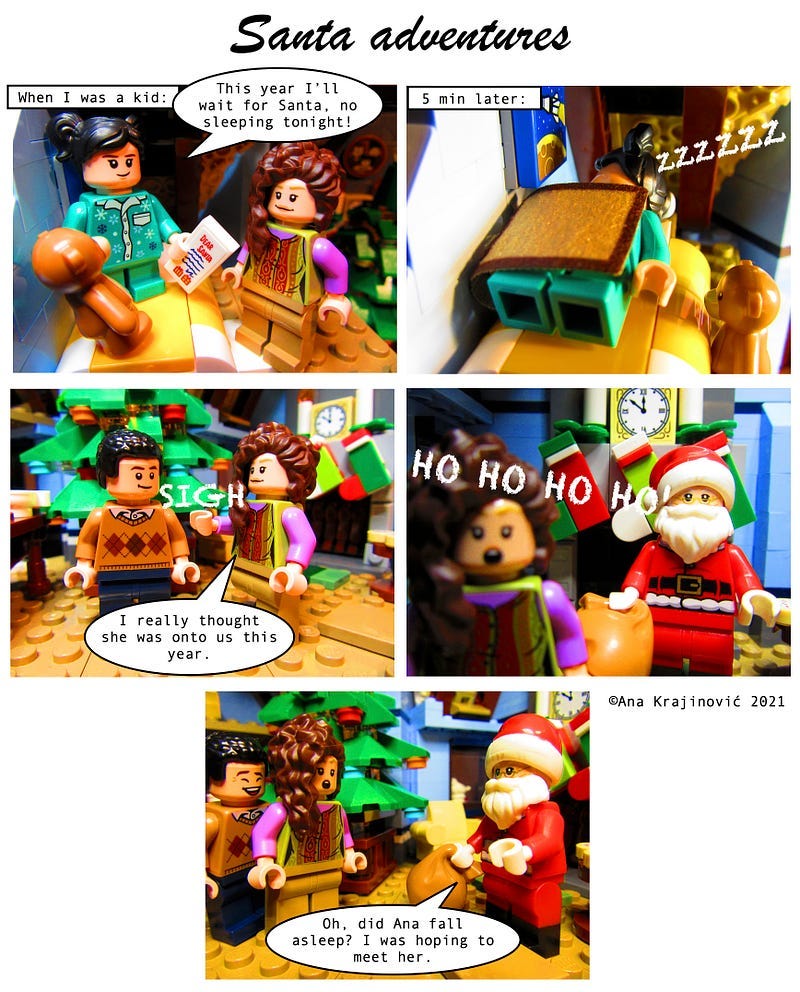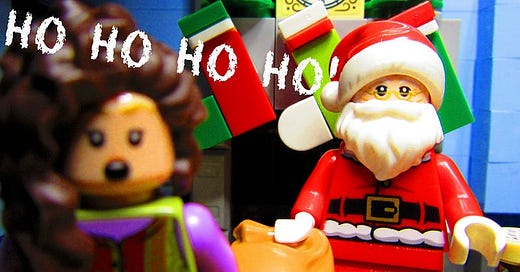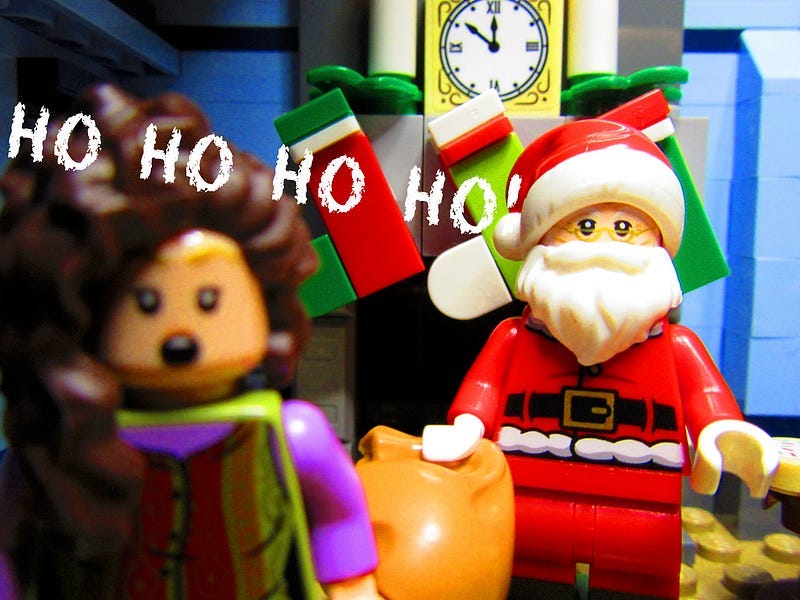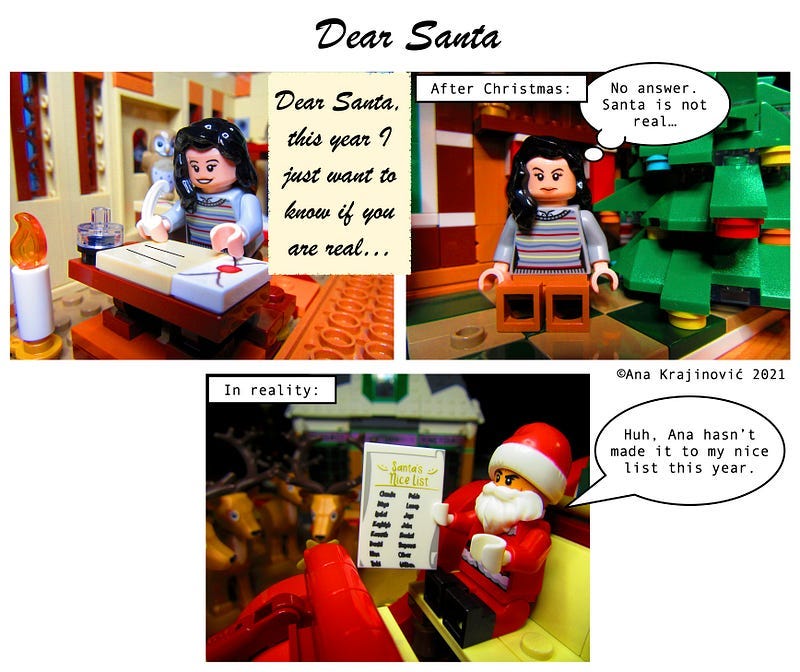Is it any good making kids believe in Santa?
I can barely see anything in the dark, but my eyes adjust and I slowly recognize that the other presents are already under the tree. I slowly take my bags and try to make as little noise as possible with these noisy plastic bags. I take each person’s present and I place it under a 3D-carton Santa I made. I wrote each person’s name on their Santa and I also put one for myself, in order to fool my brother and sister. It would be suspicious if I didn’t get one.
This year I made a few comics (below) about Santa and that got me wondering: Is it any good making kids believe in Santa? Since I am not a child psychologist and there aren’t many scientific studies done on this topic (and I am a scientific mind), I will tell you my personal story: The story of how I stopped believing in Santa and what impact the believing and the discovery had on me.
How I found out
I found out Santa isn’t real quite late. I was around 8 years old and my friends in school told me about it. Then the whole class had a huge discussion: Some kids still believed in Santa, others didn’t anymore. So, we ended up asking our teacher to settle the debate.
When she said “Kids, Santa isn’t real, it’s your parents who put gifts under the tree”, I felt so embarrassed. I was the best student in class and I really admired my teacher. I felt like I didn’t deserve my status as a good student, it was truly shattering to my identity. I perceived myself as smart, but it turns out maybe I wasn’t.
Looking back at it, I can totally see where my hyperrationality comes from these days. Today I am a scientist and I don’t hold any opinions, I only evaluate reality as more or less probable. Sure, I have my own values and my rich emotional world, but when it comes to analyzing and judging what’s around me, I am extremely cautious. You will never hear me advocating unapologetically for something, that is unless it concerns human rights and discriminated groups of people. I only advocate for anything if I truly know it’s right. And now, back to my Santa discovery when I was 8 years old.
Besides my shattered intellectual identity (at 8! I was very perceptive…), I also felt embarrassed my parents have been buying me presents every year, some of which were expensive and we were poor, and I never bought them anything. I felt embarrassed for asking or even expecting these expensive presents I knew they could hardly afford. So, that Christmas, I came up with a plan.

My super-secret plan
I was going to redeem myself. I decided to surprise my parents and leave presents from me under the tree this time. My younger brother and sister will just think it’s from Santa, but me and my parents will know it’s not. It will be our little secret. I saved some money from my tiny pocket money and went to the supermarket.
I bought some small things: a razor blade for my dad, some candy for my brother and sister, and some small cosmetic product for my mom. On Christmas Eve, I was nervous. I had hidden all the presents in bags under my bed, but I had to make sure to wake up during the night.
These were the nineties, I didn’t have a phone, I couldn’t use an alarm clock, otherwise everyone would wake up (I shared my room/living room with my brother). I had to wing it. If I’m lucky, I will wake up during the night as I often do (I was never a deep sleeper). During the night, my eyes open. I was so happy: It’s still night, I did it!
I can barely see anything in the dark, but my eyes adjust and I slowly recognize that the other presents are already under the tree. I take my bags carefully and try to make as little noise as possible with these noisy plastic bags. I take each person’s present and I place it under a 3D-carton Santa I made. I wrote each person’s name on their Santa and I also put one for myself, in order to fool my brother and sister. It would be suspicious if I didn’t get one.
The next morning, my mom and dad were truly surprised, especially my mom because she understood I put in the additional presents. My dad, on the other hand, couldn’t quite grasp it and thought that carton Santas were late additions by my mom. My mom was so proud and so happy that I felt like I probably redeemed myself, at least a little bit, for all those years of nice presents.
How I grew up
This was a rite of passage for me. In a way, I became a sort of an adult that day. I was in on it with my parents, I knew something my brother and sister didn’t, and I had the power to give “Santa’s” presents myself. I liked that. However, from today’s perspective I also see how traumatic that was.
All these feelings of embarrassment and lack of trust, not in my parents but the world at large, still haunt me to this day, not in regards to Santa of course but all the other areas of life. In a way, maybe that’s just what life is — Kids have to learn the world is also unsafe and uncertain. Somehow I think that most kids experience the change from “everything-is-amazing-and-beautiful-and-magic” to “life-is-hard-and-often-sucks-(maybe-not-all-the-time-but-yeah)” too suddenly.
The Santa discovery is just a part of the more general pattern of discovering that nothing is truly perfect and pure in life, so maybe it is an appropriate albeit parent-made milestone. I can’t really imagine how different or similar I would have been if I hadn’t believed in Santa. Maybe another life event would have fulfilled its purpose of taking me out of the “magical” bubble, but I do think I was meant to be a scientific and a creative mind either way.
Learning not to believe in something without any evidence just because it feels good is a skill I acquired completely on my own. People around me were always very religious and superstitious. Discovering small truths and putting them together into explanations that can be tested was a huge part of my personal development as a child. Maybe the Santa story encouraged that? Or maybe it prolonged the process?
I cannot tell for sure because retroactive introspection is hard and at the end of the day, I’m just one kid in a billion. It might be that depending on the personality of a child, different approaches should be taken: Some children might experience more benefits from believing in Santa and others less. We are here to learn. I wish you (and your kids) to stay curious, open-minded, imaginative, and creative, regardless of your Santa experience.
And last but not least, I see that people often contrast rationality and logic to imagination and creativity. That could not be further from the truth. If anything, learning what is more likely to be real vs. what is less likely only strengthens our perception of details that truly matter. The imagination of how to test the reality to come closer to the truth is encouraged by teaching kids to think critically and on their own. Don’t tell them what to do and what to think. Help them find the tools to discover that by themselves!
If you liked this, click follow and subscribe to my newsletter!






